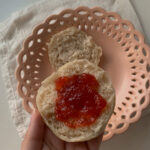Sourdough English Muffins
These sourdough English muffins are soft, tangy, and full of the signature nooks and crannies that make them perfect for toasting. This recipe makes 12 muffins and offers two cooking methods. You can either bake them in the oven for a slightly crisp finish or cook them on a skillet for a classic, golden crust. Either way, they’re a delicious way to use your sourdough starter and make a homemade breakfast staple.
Servings: 12 English muffins
Equipment
- Food scale
- Mixing bowl
- Dough whisk or sturdy mixing spoon
- Bowl scraper
- Bench scraper
- Spatula
- Plastic wrap
- Parchment paper, large sheet (oven method)
- Baking sheets, 2 (oven method)
- Optional, English muffin rings, can substitute mason jar rings. (oven method)
- Parchment paper 12 small individual pieces (skillet method)
- Skillet, griddle or cast iron pan (skillet method)
Ingredients
- 360g Bread flour
- 150g Water
- 90g Milk
- 100g Sourdough starter at peak
- 20g Sugar (can substitute honey)
- 30g Avocado oil or melted butter, plus more for frying
- 7g Salt
- Cornmeal, for shaping
Instructions
- Add the water, milk, and starter to a large mixing bowl and mix well.
- Add avocado oil, sugar, flour, and salt; mix until no dry bits remain. Use a bowl scraper and scrape down the sides so everything is fully incorporated. Cover the bowl with plastic wrap and let the dough rest for 30 minutes.
- Turn the dough out onto the counter and knead for 8-10 minutes. Use a bench scraper as needed to keep the counter clean. The dough should become smooth, elastic and slightly tacky. Place it back in the bowl, cover with plastic wrap, and let it rise at room temperature until doubled (8–12 hours, depending on your kitchen temp).
- Once the dough has doubled in size, is jiggly, and has visible bubbles, it’s time to shape. Turn the dough out onto the counter using a bowl scraper and gently press out the air. Using your kitchen scale, divide the dough into 12 equal pieces. Shape each piece into a ball, creating tension without tearing.
- Pour a pile of cornmeal onto your counter or a small plate. Dip each dough ball smooth-side down into the cornmeal, then sprinkle the top with more cornmeal and gently press into a flat disc.
Baking in oven:
- Prepare a baking sheet by lining it with parchment paper. If using English muffins rings (optional), generously grease them with avocado oil or butter and dust them with cornmeal to prevent sticking.
- Place each dough disc seam-side down on the prepared baking sheet. If using muffin rings or mason jar rings, set each dough disc inside a ring. Cover with plastic wrap and let rise in a warm spot for 1–3 hours, until soft, puffy, and airy to the touch.
- Preheat oven to 400°F (195°C). Remove plastic wrap and place a second baking sheet on top of the muffins to keep the tops flat and brown evenly. Bake for 10 minutes. Remove the top sheet, flip the muffins, and bake for another 5–10 minutes, until golden brown and the internal temperature reaches 205–210°F (96–98°C). Transfer to a wire rack and cool for at least 15–20 minutes. For classic nooks and crannies, split with a fork.
Frying in skillet:
- Once each dough ball has been sprinkled with cornmeal and flattened into discs, place each disc seam-side down on an individual piece of parchment paper on your counter. Cover loosely with plastic wrap and let rise in a warm spot for 1–3 hours, until soft, puffy, and airy to the touch.
- Preheat a skillet or griddle over medium-low heat. Add a little oil or butter just before frying. To transfer the muffins easily, lift one by its parchment paper, gently flip it upside down into your hand to remove the paper, then flip again and place it seam-side down in the skillet. Cover with a lid and cook for 4–5 minutes. Flip, cover again, and cook another 4–5 minutes. Remove the lid, flip, and cook 2 more minutes on each side uncovered. Muffins are done when golden brown and the internal temperature is 205–210°F (96–98°C). Transfer to a wire rack and cool for at least 15–20 minutes. For classic nooks and crannies, split with a fork.
